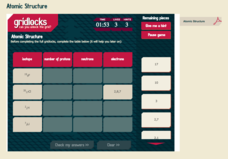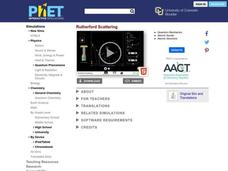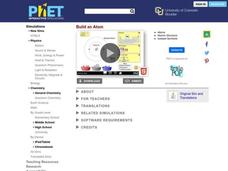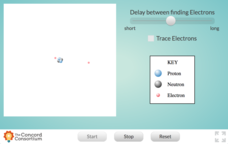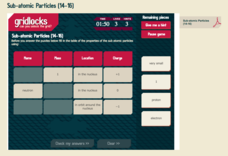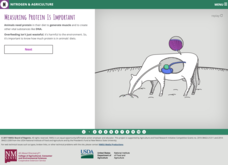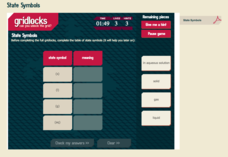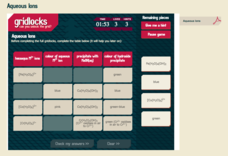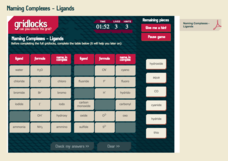Curated OER
All About Circuits ~ Atomic Structure
In this interactive Internet assignment, physical science investigators answer 11 questions about the atom, the subatomic particles, and atomic structure. They can click on "Reveal Answer" to discover if they are correct. They also...
Royal Society of Chemistry
Atomic Structure
Changing the number of neutrons in an atom makes it an isotope, but it does not change the element. Pupils complete logic puzzles, matching isotopes with their unique number of protons, neutrons, and electrons. Either on paper or timed...
Scholastic
Study Jams! Atoms: Protons, Neutrons, Electrons
What's smaller than a kiwi seed? Atoms! Basic atomic structure is detailed for beginning chemists in a light-hearted animation. Protons and neutrons are explained as part of the nucleus, and so are electrons that encircle the nucleus....
PhET
Rutherford Scattering
Rutherford performed his famous experiment in 1907 with Marsden, showing the true atomic structure. This interactive simulation compares Rutherford's historical experiment to the Plum pudding model of the atom. In both models, alpha...
Curated OER
Regents High School Examination PHYSICAL SETTING CHEMISTRY 2008
In this matter exam, young scholars answer 80 multiple choice and short answer questions about atomic structure, atomic bonds, and equations dealing with energy spectrums. A scientific calculator is recommended. There is a student answer...
Study Stack
Atomic Structure Crossword Puzzle
In this online interactive atomic structure crossword puzzle worksheet, students use 5 clues to find the appropriate answers to complete the word puzzle.
PHET
Build an Atom
Scholars build specific elements by creating a model of its atomic structure. Objects they can include are protons, nuetrons, electrons, orbits, clouds, charge, and mass number. Simulation ends with questions to challenge individuals'...
Concord Consortium
Atom and Ion Builder
Explore and control the building blocks of atoms! Physical science superstars add and remove subatomic particles to create atoms and ions with an easy-to-use interactive. An alternate activity includes an assignment that focuses on the...
Concord Consortium
Structure of an Atom
Feeling a little uncertain about your materials for teaching the quantum mechanical model of the atom? Here is an interactive that will help! Chemistry and physics scholars alike will benefit from a simple resource that illustrates the...
Royal Society of Chemistry
Sub-Atomic Particles (14-16)
In 1897, J.J. Thomson discovered the electron, the first subatomic particle proven to exist. Scholars review their understanding of electrons, protons, and neutrons as they work through the puzzles. Each puzzle connects two or three...
Learning Games Lab
Nitrogen in Feed
Knowing what farmers are feeding livestock is just smart business. A WebQuest lesson helps learners build an understanding of the relationship between amino acids, nitrogen, and protein. With interactive instruction,...
Royal Society of Chemistry
Sub-shells
Is your class in a quandary over quantum numbers? Change things up by adding games to the mix! Science scholars discover the shape, number of electrons, and number of orbitals in the s, p, and d sub-shells using an interactive.
Concord Consortium
Crooke's Tube
Behold, the electron is discovered! Take young scientists on a journey back through time to examine JJ Thompson's famous experiment using a Crooke's tube. Pupils manipulate the charge on the apparatus' horizontal plates, observe cathode...
Royal Society of Chemistry
Units of Volume
Did you know in the UK a quart is smaller than in America? This explains why a standard unit of measure is necessary for volume. Young scientists learn the similarities and differences between five different units used to measure volume....
Royal Society of Chemistry
Moles Equations (14-16)
In chemistry, the mole is a unit of measurement, much like a millimeter or liter. After learning about moles, scholars learn various equations relating to mass, volume, and concentration. They review each of these equations in a few...
Royal Society of Chemistry
Forensic Tests
Flame tests determine if there is a specific metal in a chemical compound. Young forensic scientists review their understanding of flame tests and hydroxide precipitates by solving puzzles. The timed review encourages mastery.
Royal Society of Chemistry
State Symbols
When water is a solvent in a chemical equation, we consider it an aqueous solution. Scholars match the name of four states of matter to their proper symbol in a chemical equation. Four puzzles provide repetition to help pupils remember...
Royal Society of Chemistry
Types of Bonding
A covalent bond yells at an ionic bond, "Didn't anyone teach you to share?" Four matching puzzles allow pupils to review covalent, ionic, and metallic bonding. They apply logic and problem solving to complete gridlocks including the...
Royal Society of Chemistry
The Blast Furnace
The largest chemical reactors are blast furnaces, used to make iron from ore. Scholars explore reactants by first matching each one to its purpose and formula. Then, a series of three gridlock puzzles reinforce the content while...
Royal Society of Chemistry
Aqueous Ions
Lose an electron? You should keep an ion it! Scholars test their knowledge of aqueous ions while completing four puzzles. Each puzzle requires knowledge of the ion, the color of the ion, the precipitate, and the color of the precipitate.
Royal Society of Chemistry
Naming Complexes—Ligands
Naming complexes can be, well, pretty complex! Simplify a study of ligands using interactive puzzles. Junior chemists match up the name, formula, and complex name, then solve a series of logic games with the information.
Royal Society of Chemistry
Complex Ion Shapes
Things are really shaping up! Provide young chemists with polyatomic ion practice using an interesting interactive. Individuals complete puzzles focused on molecular geometry and complex ions.
PBS
Pbs Learning Media: That's My Theory!
Become a game show contestant in this online activity from A Science Odyssey and ask a series of questions to a panel of mystery scientists, using the answers to determine which scientist is Einstein.

